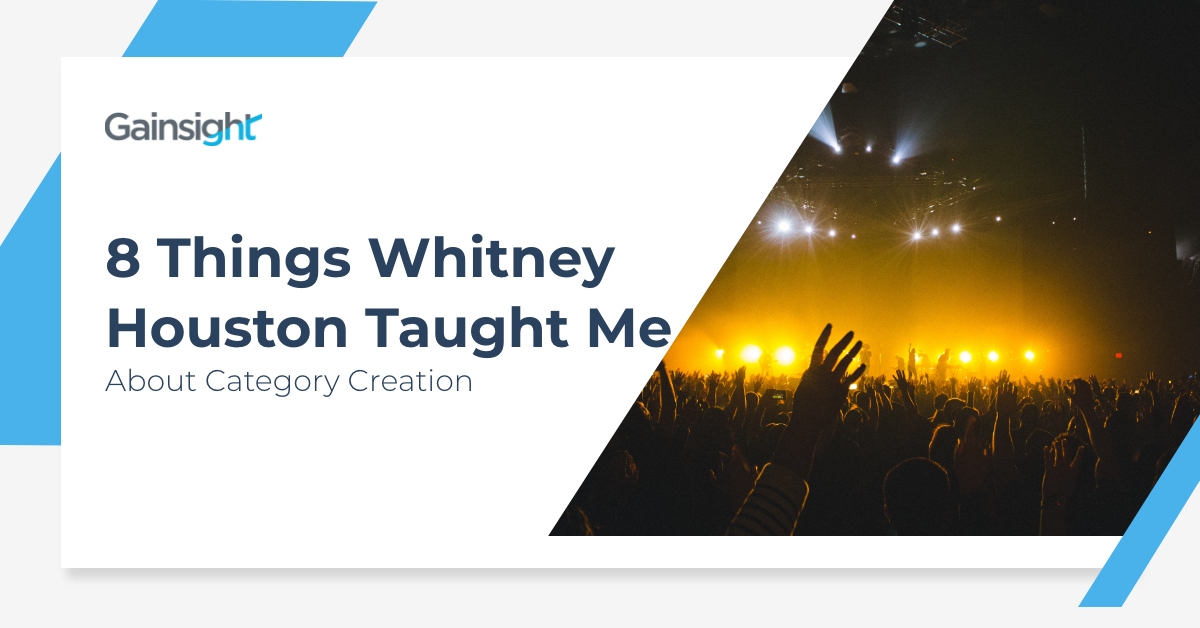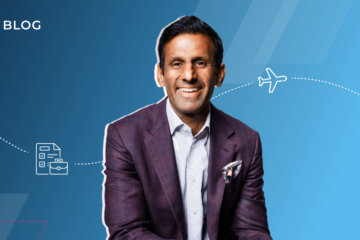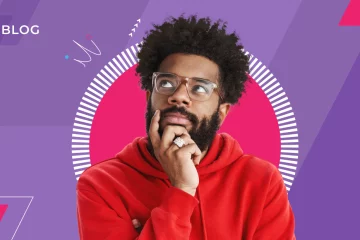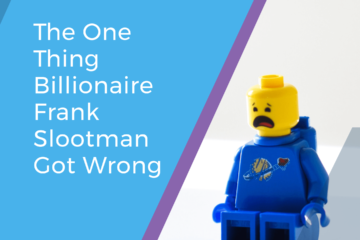8 Things Whitney Houston Taught Me About Category Creation

On February 4, 2021, my team reminded me of my 8th anniversary at Gainsight (Gainaversary!)

Contrary to what some people might think, I was not an original Gainsight founder. I joined our two founders (Jim Eberlin and Sreedhar Peddineni) very early (around $100K ARR) before officially launching Gainsight in 2013.
To paraphrase a great quote from Gretchen Rubin, the days of helping to ignite the Customer Success movement were long, but the 8 years feel short. And there were so many memories along the way, many from our Pulse conference. From one-and-done rap careers to Disney-esque musicals to the Back Street Boys inspiring us, our value of Child-like Joy definitely filled my bucket over the last decade. But if I had to pick my favorite memory, it would certainly be “Taylor Swift” (impersonator) performing the version of “Blank Space” that I rewrote for the CS world to a shocked audience that thought we had hired the real TS!

So what did I learn over 8 years? Honestly, I’m not sure. I would say that I made at least 100X the number of bad decisions versus good ones. But if I had to do it over again, a few things come to mind. And since we are going retro, let’s channel one of my favorite artists of all time, Whitney Houston, for inspiration:

1.Find a “Higher Love” than Your Product
Nearly every “category-creating” company ends up standing for something. While Salesforce started in Salesforce Automation, they initially stood for the cloud and the idea of “No Software.” Over time, they became a symbol for many things – diversity, inclusion, equality, and more.
While I’d love to claim we started with lofty ideals, our origin was more practical. We launched in 2013 with the premise of “software for Customer Success Managers.” The reality was there were probably 1000 CSMs in the world at that point. So out of necessity, we had to find a bigger purpose.
Initially, that purpose involved becoming the champion for the Customer Success profession and “movement.” Over time, we expanded that purpose to advocating a new way of doing business – in our words, “to be living proof that you can win in business, while being human-first.”
2. “I Have Nothing” without the Careers of Our Customers
In the spirit of aiming for a higher purpose, one thing we learned along the way is the true definition of Customer Success. It’s not just about retention and expansion. It’s not merely about outcomes and experiences. The ultimate manifestation of Customer Success is when the humans at your clients thrive in their careers.
As such, we spent a large chunk of our time focused on helping our clients personally. I made hundreds and hundreds of introductions – between CS professionals looking for their next role and companies trying to build a team. We launched CSM training programs and pathways for underrepresented minorities to break into the burgeoning profession.
For most of us, our proudest moments were when we watched human beings that we respected in the CS profession update their LinkedIn profiles with accolades, promotions, and new roles.
3. Remember, Events Are Your “One Moment In Time”
While “trade shows” and “user conferences” in tech are tried and true practices, we found that we could do much more. Rather than focusing on our product (per point #1 above), we raised our goal to make our Pulse events industry gatherings focused on topics on the minds of practitioners – like CSM compensation, org structure, and training.
And we went all out with every event. I found that Pulse became an incredible rally cry for our team. Product, Marketing, CS, Sales, and other functions focused their deliverables around the event. And everyone left with a new level of passion for the company.
4. “How Will I Know” When I Reach Product-Market Fit
Despite all of the talk of a “higher love,” we also did have to make money eventually by selling our software! Like all companies, we had to build our roadmap and product vision. But the challenge was our clients were figuring out their own needs in parallel. So we had to remain agile as the market evolved. Every time we thought we had completely figured it out, we found there was more to do. As such, category creation absolutely feels like the myth of Sisyphus pushing the rock up the hill every day.
For us, the moment we knew was when we started to see advocates using Gainsight at one company and then making it part of their plan right away in their new job. Finally, it’s felt like the rock was slightly rolling downhill.
5. Get “So Emotional” with Vulnerability
An underreported part of category creation is human connection. People buy from people. Part of business is about giving people a feeling of belonging. Over the years, we’ve hosted hundreds of events (big and small), and when I ask attendees afterward what the biggest value was, the universal answer was always “I feel less alone.”
Channeling this, we tried to be brave and vulnerable with the Pulse community. I remember pulling on my inner Brene Brown at Pulse 2017 in Oakland, CA, and sharing with my closest 4,000 friends that I was incredibly lonely as a kid (no friends, lunch alone, etc.) I cannot overstate how much of an impact vulnerability has had on our community. If one person shows up authentically, it encourages others to do the same. Over the years, our entire team and our clients have come to our events with a feeling of raw candor that I rarely see in tech events.
6. “Dance With Somebody” with Child-like Joy
But after all of the tears and feels, it’s good to blow off some steam. One of our values at Gainsight is “Child-like Joy” – bring the kind in you to work every day. We certainly became known for being a bit… childish (see rap songs and musicals above). What’s incredible is how much this amplified our community connections. Customers wanted to be in the music videos. Execs remixed our rap songs. Chief Customer Officers shared their childhood dreams in Zoom happy hours. At the end of the day, we were all at our best as kids. It’s a superpower to bring some of that back as adults. The videos were also pretty good deal closers!
7. It Works “When You Believe”
If I had just one business lesson, though, above all others, it’s patience. Things just take time. Sometimes your business is a “snowflake” – like Snowflake – and it explodes overnight. But in many instances, overnight successes were the result of years of painfully watching the clock. I remember a quarter in 2013 where we closed 0 new deals (that sucked). Throughout Gainsight’s journey, I’ve always asked myself a few questions to keep me focused:
- In the future, will there be more or fewer cloud businesses? Obviously more.
- In the future, will customers have more or less power in the cloud model? Obviously more.
- In the future, will vendors need to be proactive, given customer power? Obviously yes.
In other words, we knew that it was inevitable. We just had to be patient.
8. The “Greatest Love Of All” Has To Be Your Journey
One of the oldest adages in the CEO world is that the “job is lonely.” Part of that is certainly because it’s hard to talk about some issues with the people around you. But I find that there is a different loneliness that’s worth discussing. If you “go long,” it’s highly likely that very very few people will have been there the entire time. Cofounders move on. Board members change. Executives rotate out. Longtime teammates find their new adventure. You say goodbye a lot. You have to get good at it.
And at some point, you have 8 (or hopefully more) years of memories in your brain. Amazing moments. Smiles. Laughs. Hugs. Wins. Losses. Joy. Pain. Laughter. Tears. Everything. And the only person that saw it all is you. You can reconnect with alumni (which is very helpful) and reminisce with teammates. But at the end of the day, the only person who saw the whole movie is you.
This brings me to why I was thinking about Whitney on my 8 year Gainaversary. To be honest, I was feeling a little bit lonely. And I remember her words:

The greatest love of all Is easy to achieve Learning to love yourself It is the greatest love of all
If you don’t love yourself, you’ll never make it. That is the first, last, and most important lesson I’ve taken away.



